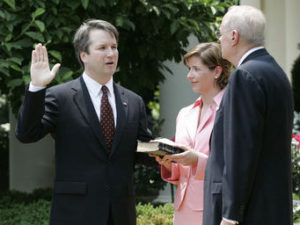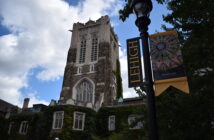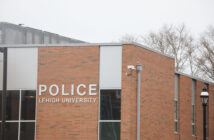
Supreme Court Justice nominee Brett Kavanaugh was sworn into the U.S. Court of Appeals for the District of Columbia Circuit on June 1, 2006, in the Rose Garden. Kavanaugh’s nomination for the Supreme Court was advanced by the committee and is pending a vote after yesterdays hearings from both Kavanaugh and Dr. Christine Blasey Ford. (Courtesy of Eric Draper/Wikimedia Commons)
UPDATE: The Senate confirmed Brett Kavanaugh to be the next U.S. Supreme Court Justice by a vote of 50 to 48 on Saturday. Kavanaugh was sworn in hours later in a private ceremony, when Chief Justice John Roberts administered the constitutional oath.
The confirmation process, which at one point seemed a sure thing with Republicans in control of both legislative branches and the White House, was derailed after Christine Blasey Ford’s testimony in front of the Senate Judiciary Committee. Ford alleged that Kavanaugh sexually assaulted her when they were in high school together.
The testimony prompted a one-week FBI investigation into the matter.
Justice Kavanaugh’s confirmation was cleared when three senators, who had not announced how they would vote as of Friday morning, decided to back Kavanaugh. Republicans Jeff Flake of Arizona and Susan Collins of Maine, along with Democrat Joe Manchin of West Virginia, concluded that Ford’s allegations could not be corroborated.
The impacts of Kavanaugh’s emotional confirmation process have extended far past Capitol Hill.
Brooke DeSipio, the director for Gender Violence Education and Support at Lehigh, said that national hotlines saw major increases in reports of sexual misconduct following the Kavanaugh hearings. Colleges and universities nationwide, specifically, saw an increase in reports as well.
UPDATE: The Judiciary Committee voted 11 to 10 to move the nomination to a full senate vote, but Sen. Jeff Flake said he’ll only vote to confirm Kavanaugh after a week delay for an FBI investigation.
The Senate Judiciary Committee voted Friday morning to advance the Supreme Court nomination of Judge Brett Kavanaugh, who has been accused by three women of sexual assault.
The vote, which was 11 to 8 with two abstentions, ensures that Kavanaugh’s nomination will soon be put to a vote by the full Senate. The vote occurred the day after historic testimony on the Senate floor from Dr. Christine Blasey Ford, one of Kavanaugh’s accusers, and Kavanaugh himself.
Kavanaugh was nominated by President Donald Trump on July 10 after Justice Anthony Kennedy announced his retirement from the nation’s highest court. Kavanaugh is a Yale Law School graduate and has served on the D.C. Circuit Court for 12 years.
This is President Trump’s second nomination for the Supreme Court, the first being Justice Neil Gorsuch, who was confirmed last year.
Prior to the committee vote, Senator Richard Blumenthal, D-Ct., put forward a motion to subpoena Mark Judge, a high school friend of Kavanaugh’s who was reportedly in the room with Kavanaugh and Ford at the time of Ford’s alleged assault. Blumenthal’s motion failed on a party line vote, with 11 Republicans against and 10 Democrats in favor.
According to political science professor Dr. Jennifer Jensen, the controversy surrounding the nomination of Kavanaugh is unsurprising. Just like the historic testimony of Anita Hill in 1991 that accused now-Justice Clarence Thomas of sexually assaulting her, it’s been hard to corroborate the narrative.
“We are talking about types (of) events that, almost by their very nature, are not likely to have witnesses,” Jensen said in an email. “In both the Thomas and the Kavanaugh hearings, credibility stems from things like composure, mannerisms, and tenor of voice in addition to the statements and question responses themselves. This means that in many ways credibility is in the eye of the beholder, and we have seen that there is a partisan streak in this.”
Cynthia Gatua, president of the Lehigh University College Democrats, pointed out instances of Kavanaugh making false claims under oath, such as claims regarding documents that had been stolen from Democrats when Kavanaugh worked in the administration of President George W. Bush.
“I perhaps would be more willing to take this as a ‘he said she said’ if both were clearly honest people,” Gatua said in an email. “But he who lies in small things lies in large.”
The Lehigh College Republicans did not respond to a request for comment at the time of this writing.
This story will be updated when more information becomes available.





Comment policy
Comments posted to The Brown and White website are reviewed by a moderator before being approved. Incendiary speech or harassing language, including comments targeted at individuals, may be deemed unacceptable and not published. Spam and other soliciting will also be declined.
The Brown and White also reserves the right to not publish entirely anonymous comments.